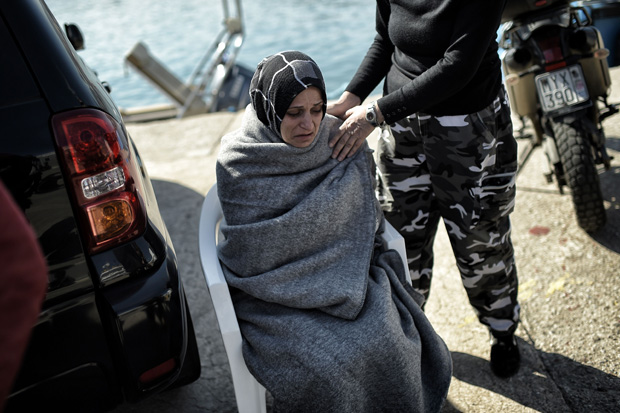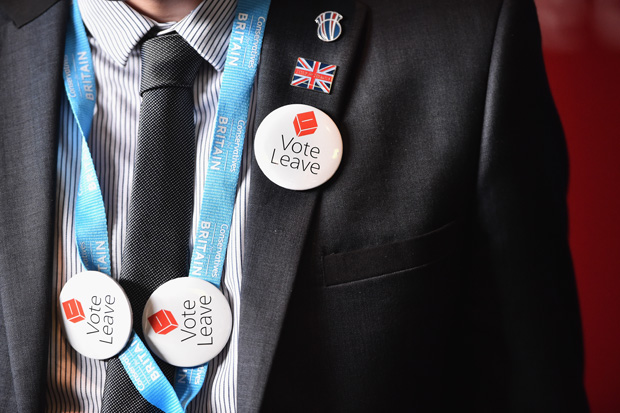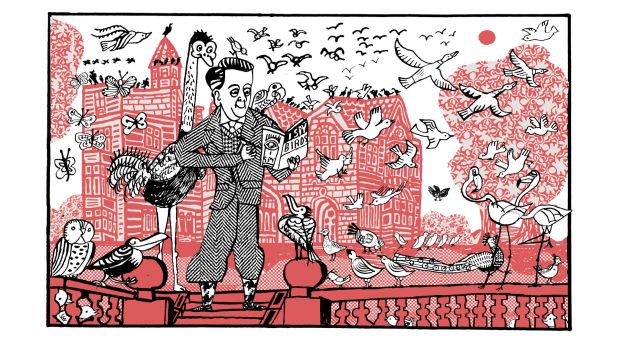Istanbul
Shops in a rundown neighbourhood sell fake life jackets to refugees planning to brave the Aegean Sea. Last year, nearly 4,000 refugees died trying to make this journey. ‘But what am I to do?’ says Erkan, a shopkeeper, as he pushes me out of his shop. ‘I tell them they are fake but the poor souls continue to buy them. The genuine ones don’t sell so well.’
We’re in the suburb of Aksaray, the makeshift centre of the smuggling trade in the city. Here the language is Arabic and the restaurants are Syrian. A town square serves as a hub for migration brokers. This is where dreams are sold. Each night, hordes of Syrians fill the area, their lives on their backs, preparing for the dangerous journey ahead.
Behind the 19th-century mosque are dozens of money-exchange offices. These are fronts for the ‘deposit banks’ where migrants leave their money after closing a deal with one of the people-smugglers. The payment is only handed over if the refugee successfully reaches European shores.
If you can’t find a deal in Aksaray, offers abound on the internet. Facebook groups, set up in Arabic, advertise a range of services. One reads, ‘Istanbul to Greece, only $650/person. Leaving every night, call Muhammad for details.’
So I did just that, with the help of Abdurrahman, a Syrian friend. The cheapest route on offer, Muhammad told us, is across the Aegean sea to a Greek island. ‘When you leave the Turkish coast, you can see Greece. It’s only one hour away,’ he assured us, quoting a range of prices: $500 for a boat to as much as $10,000 for a fake European passport. ‘Once you land in Greece, the Red Cross will help you and select a country where you can claim asylum.’ This is not true — but it was a statement repeated by every smuggler I spoke to.
Last week, a new agreement between Turkey and the EU was thrashed out and hailed as a breakthrough. Turkey agreed to shut down the people-smugglers and take back any refugee crossing to Greece. For every refugee readmitted, another will be resettled from Turkey to another EU member state. The EU is offering €6 billion to sweeten the deal — twice the figure offered last November — and will grant Turkish citizens visa-free travel to Europe. Turkey’s long-stalled application to join the EU will be fast-tracked. The EU is desperate and Turkey holds all the cards. Turkey’s willingness, let alone capacity, to keep its side of the bargain is questionable at best.
There are no police to be seen in Aksaray. Abu Omar, a smuggler loitering in the square, laughs off Turkey’s deal as little more than hot air. ‘The Turkish coastguards aren’t doing anything,’ he assures Abdurrahman, who is posing as a potential client. ‘It’s a question of luck whether you’ll make it or not.’ The new Brussels agreement won’t save the unlucky.
Abu Omar is one of many Syrian brokers in Aksaray who connect migrants to smugglers and hope eventually to save up enough money to make the crossing to Europe themselves. It’s the Turks who control the business. ‘Turks are at the heart of the smuggling operations,’ explains Ahmad, a Syrian who now lives in the UK — having spent two months being smuggled in from Syria last year. ‘They organise everything, including co-ordinating with the police and coastguards.’
This month, a Turkish court sentenced to four years in jail the smugglers responsible for the death of Alan Kurdi, the three-year-old Syrian boy washed up on Turkey’s shores last September. But such crackdowns have been few and far between, and do nothing to deter smuggling operations. More than 110,000 refugees have made the crossing to Greece this year. ‘Everybody knows that nobody can stop a smuggler — they’ll always find a way,’ Ahmad explains. ‘It will simply become more expensive.’
Last year swollen demand caused a boom at the cheap-and-dangerous end of the market, which meant a rise in the number of refugees drowning. With the EU deal, smugglers will take greater risks to organise longer voyages, perhaps from Turkey to Italy or across the Black Sea. Many have died making the Aegean crossing, but the relative proximity of the Greek islands means it is a safer route than across the Mediterranean.
The Turkish government is suspected of deliberately turning a blind eye to the smuggling problem in order to extract a better bargain from Brussels. President Erdoğan was quite open about this blackmail, threatening to ‘bus migrants to Europe’ if the EU didn’t accept his demands. But even if Turkey wanted to crack down on the networks of human traffickers, there are doubts as to whether it would succeed. ‘Ankara is likely to have made promises in Brussels that it can’t and won’t deliver,’ said Aykan Erdemir, a former opposition politician, now a senior fellow at the Foundation for Defense of Democracies in Washington. ‘Human smugglers will outsmart the Turkish authorities just as they have outsmarted EU authorities.’
President Erdoğan, dogged by controversy, is an awkward partner for the EU. Earlier this month he made headlines by seizing control of Turkey’s leading opposition newspaper, Zaman. This week he reignited a war with Kurdish militants in the south-east, forcing thousands of Kurds to flee their homes. In recent photos, the besieged city of Cizre resembles Aleppo.
Syrians, too, are feeling the sharp edge of Erdoğan’s nationalist stance. Having initially announced an open-door policy, Ankara has since silently reversed it. Amnesty International condemned the illegal deportation of Syrian refugees late last year.
Many Syrians, lacking a legal status in Turkey, have set their sights on Europe. But the EU deal fails to confront a fundamental difference between Europe and Turkey: the right to asylum. Turkey is a signatory to the 1951 Geneva Refugee Convention, but her responsibilities are limited to those fleeing Europe. Refugees from the war-torn Middle East are classified as temporary guests and barred from working. The majority of Syrian children can’t even attend Turkish schools.
Back in Aksaray, I speak to another group of Syrians. Most of them work in black-market bakeries and live with their families in squalid one-room apartments on the outskirts of Istanbul. Adnan, a 22-year-old Syrian from Aleppo, is the most vocal. He is trying to save enough money to get to Europe. I ask whether he has any Turkish friends. ‘Of course not,’ he says. ‘Turks simply exploit us. How could we be friends?’
For Adnan, Europe is still synonymous with hope. But not all migrants feel the same way. ‘Forget Europe,’ one Syrian man tells me. ‘The dream is over. They don’t want us. Go back to Syria and fight — that’s what I’m going to do.’
Got something to add? Join the discussion and comment below.
Get 10 issues for just $10
Subscribe to The Spectator Australia today for the next 10 magazine issues, plus full online access, for just $10.
You might disagree with half of it, but you’ll enjoy reading all of it. Try your first month for free, then just $2 a week for the remainder of your first year.














Comments
Don't miss out
Join the conversation with other Spectator Australia readers. Subscribe to leave a comment.
SUBSCRIBEAlready a subscriber? Log in